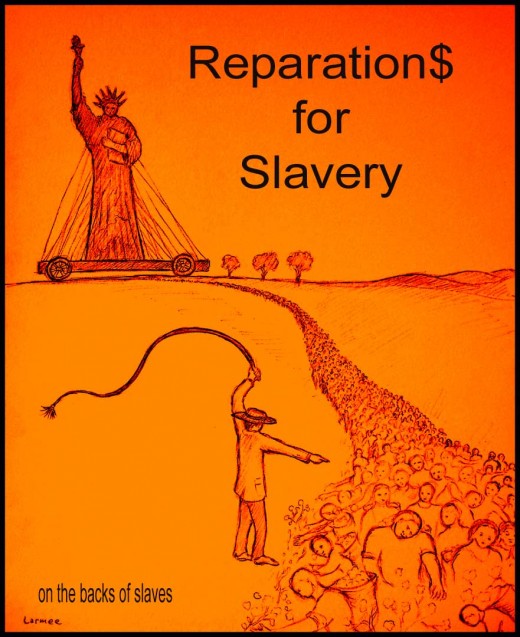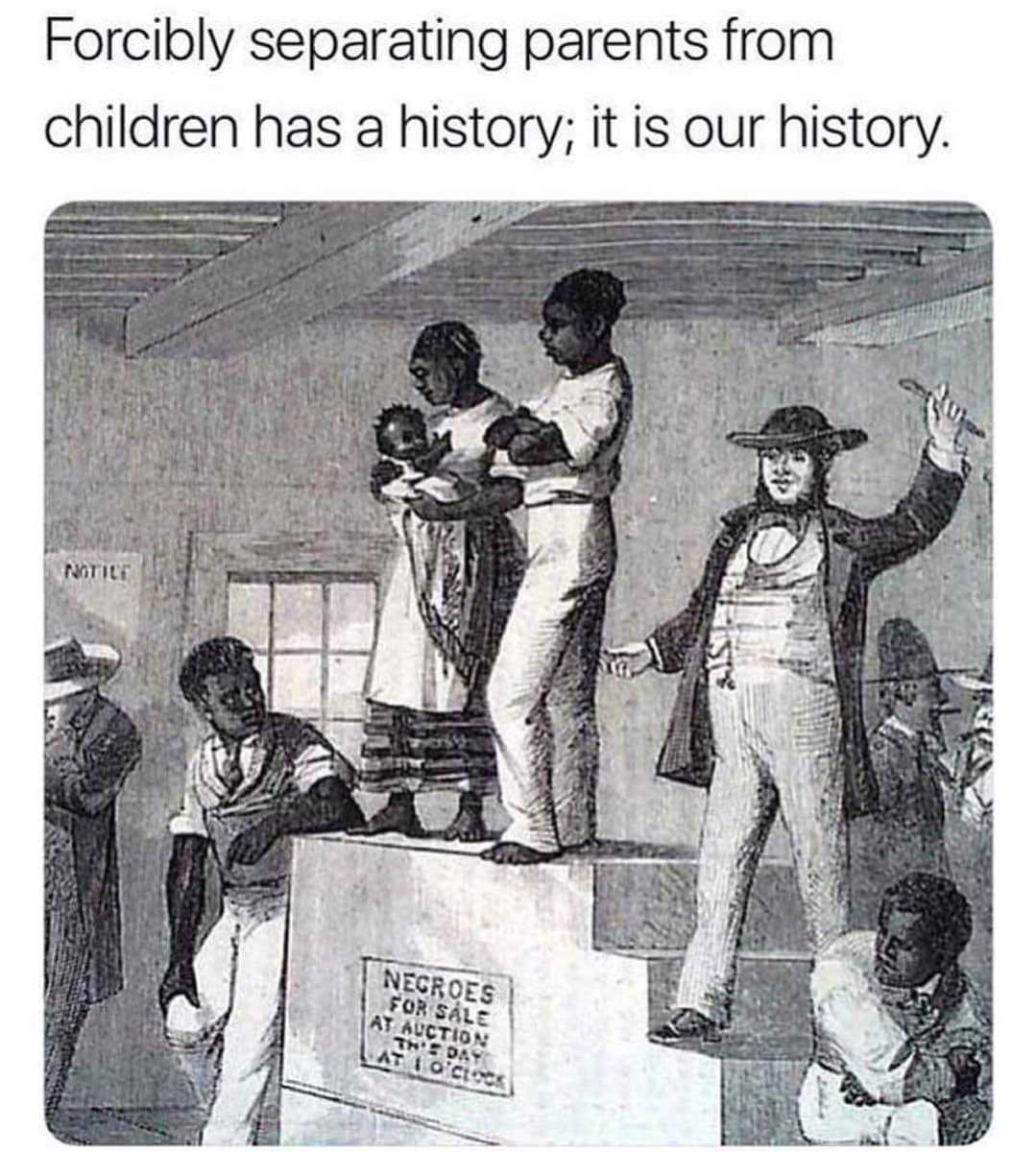Barack Obama And Slavery Reparations

The Law of Punishment and Reward
Anyone who captures a free person, brings them to another country against their will, forces them to do manual labor without pay, while physically and psychologically abusing them – denying them equal rights to resources are creating a moral and ethical system by which redress is inevitable. Although the era supported this type of behavior and it was acceptable by the legitimate government one could argue that no wrong was committed – except the one who was subjected to the treatment. For them, it was not consensual therefore it's illegal and degrading. Let’s say he/she was subjected to this type of treatment suddenly and unexpectedly. The psychological ramifications would be astronomical leaving mental scars for generations to come.
Let’s go a step further to say that his/her generation for the next two hundred years or more was subjected to this type of treatment from the time they were born to the time of their death. Let’s include the notion that the captured individual wanted to return to their home land and was not only denied the right, but was brutally killed for the thought. Taken a step further, let’s say the captured individuals tried to escape the brutality of their environment but was recaptured, ridiculed and tortured in the presence of thousands. And to conclude let’s say the captured people was suddenly freed – given the rights as free people, then the individual would probably sue and be awarded a lot of money. That’s the law of punishment and reward.
It’s also the law by which Native-Americans, Korean-Americans, and Jewish-Americans were awarded reparations for lesser or equal treatment. It should be noted here that Jewish-Americans were not awarded reparations by the American government but by the German government for actions from the Holocaust. Nevertheless, their treatment were recognized and subsequently rewarded. In the year 2013 we now have an influx of immigrants into America who are moving into nice homes, attending nice schools, and receiving monetary rewards through welfare and other socio-political programs. These new arrivals did nothing more than fill out a little paperwork to receive these benefits. At the same time we have African-Americans who feel forced to compete with these new arrivals for resources they feel they’ve earned through years of mistreatment. Certainly one can understand their concerns, whether they agree with them or not.
On the other hand one can argue quite effectively that African-Americans have had plenty of time, resources, and opportunities to elevate themselves on the social, political, and economic ladder – but fail to do so, for one reason or another. One can argue that African-Americans have enjoyed freedom from slavery for more than 200+ years but have not capitalized on the same capitalistic opportunities afforded to the newly arrived immigrants. This certainly would not be the fault of the government – or would it?
The group against reparations has provided strong argumentative data to prove their point that reparations for slavery would be a major mistake and should not occur. This group feels that reparations would cause racial and ethnic divisions which would be deeper than what already exist. The group in support of reparations fashioned their argument from what they perceive to be the legality of the First Freemen’s Act created in early 1864 and signed On March 3, 1865. This act, in conjunction with others initiated by Congress and signed generations later by then President Bill Clinton gave credibility to the claims by decendents African slaves for reparations or redress for the wrongs of the government.
The demands for reparations appear to die out and regain momentum with each generation. For a large percent of White-Americans, it seems ridiculous to expect the government to award people for the sins of the forefathers. After all, it was not only acceptable by the government to use slave labor but it was also the custom of the times - and a few blacks themselves owned slaves. The majority opinion is that the Emancipation Proclamation freed the government of all wrong doings in the 1800’s. Blacks were allowed to express their freedoms and actually experienced social, political, and economic progress during the Reconstruction era. It is the opinion of some that Black progress slowed after Reconstruction because of the rhetoric of the black leaders who emphasized government support and made blacks feel that the government owed them and all they had to do was wait for their 40 areas and a mule – a promised made to them by the Government under The First Freemen’s Bureau Act rectified by Congress in 1864.
The early 1950’s, which signified the beginning of the Civil Rights Movement to the late 1970’s brought about a whole new revolution of black pride and demands of the government. As a result, Affirmative Action and the 1965 Voting Rights Act was born. However, Blacks felt that this was not enough to repay for the mental legacy of slavery. After all, Whites still owned the majority of the lands, banks, businesses, legal system, the government, and blacks were still being treated like second class citizens while racial discrimination was at its peak. Blacks who argue for reparations also cite the fact that Blacks most likely would be in a better economic position if the principles of the Freedman’s Act was honored - but it was not and as a result the land awarded Blacks (which is now considered parts of the state of Florida) in 1864 after the Civil War was taken from them and given back to whites by the same government who feared the White backlash, and possibly another Civil War. Blacks considered this a major breach which the government never resolved.
African-Americans today will argue that they are not filing reparation claims based on what happened to their ancestor’s generations ago. They admit that such a claim would not hold a cup of frozen tea. By contrast their claim is based on the notion that they are injured today by the institution of slavery which denied them basic rights for self-government. This denial took away income and property which they feel they rightfully earned. These basic rights are the same basic rights behind most wars in America and other countries. If Americans can glorify the taking of and value of land ownership by the early settlers through history books then surely they can understand the plight of African-Americans.
The issue of Slavery Reparations can effectively be argued from various consequentialist viewpoints – depending on what side you’re on. Despite the assumptions of the early settlers who may have felt that slavery was a just cause, the overall institution was void of any human morality. For a country built on Christian principles they should have known better. Perhaps this was a form of individual psychological egoism in its rawest state. The government’s viewpoint appeared to have been a raw form of ethical egoism which dictates that everyone should act in its best interest or be punished, which may explain why those who knew slavery was wrong silently supported it.
In the area of reparations, it would appear that the Act Utilitarianism should prevail as the logical thought among the masses. But what about the African-Americans who are seeking billions of dollars in reparations – where do they stand on the ethical scale? Certainly their demands do not appear to be carefully thought out in the larger scheme of life. Perhaps their demands are better described as the Cost-Benefit Analysis, or End-Justifies-the Means approach. It is very apparent that Consequentialist and Non-consequentialist theories are deeply embedded in the argument for and against reparations. After all, it is a very complex, emotional issue designed around its very own independent moral system.
Over the years most African-Americans have developed a moral system of cultural absolutism which suggests that moral principles do not vary from culture to culture, or group to group. They may vary in specifics but the underlying principles for morality are the same. Therefore they are at a lost as to why it is so difficult for the government to understand their viewpoint on reparations, generations after the fact. After all, everyone wants what they feel rightfully belongs to them. Some go as far as to take it - by any means necessary.
Slavery Reparations will probably remain an unresolved socio-political issue with African-Americans for generations to come. Freedom and determinism go hand in hand in their quest for reparations. The court’s decision to throw out a lawsuit in support of reparation, in the minds of some African-Americans, is just another minor stumbling block to overcome. If they do not succeed in this generation, perhaps they will succeed in the next. However, each new generation will be further from the resolution than the previous generation. Knowing this to be true African-Americans feel they are racing against the clock – and every new day works against them.
Both Black and White Americans of the younger generation have deemed the election of President Obama as the 44th President of the United States a step closer, perhaps as close as America will come to resolving the case of slavery reparations. Perhaps President Obama has done little to resolve the issue but he has certainly given a whole new twist to the subject, perhaps making the case even harder to win.
What will the eventual outcome be.....? Time will tell!





